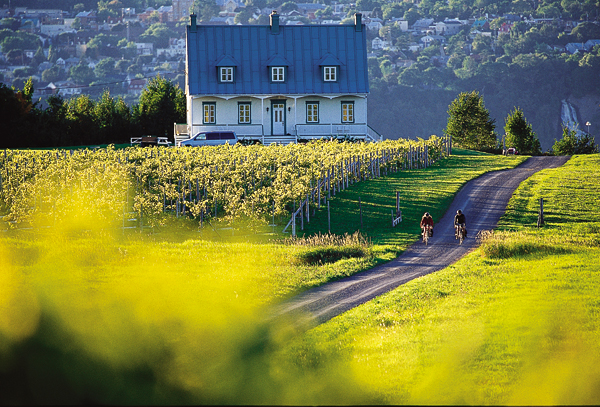Browse "Places"
-
Article
Iconic Highways in Canada
Canada’s most iconic highways were all built in the 20th or 21st centuries. Before the car became popular, good roads were hard to find once you left a city. As simple as they seem, it’s expensive to build and maintain roads. Rural routes were often treacherous for travelers. Modern highways connect our massive country. A few of them stand out for their length, origins, or wondrous landscapes.
"https://d2ttikhf7xbzbs.cloudfront.net/media/new_article_images/IconicHighways/AlaskaHwy.jpg" // resources/views/front/categories/view.blade.php
https://d2ttikhf7xbzbs.cloudfront.net/media/new_article_images/IconicHighways/AlaskaHwy.jpg
-
List
Iconic Streets in Canada
Every city has a few streets that stand out above the rest. Perhaps they’re a shopping haven, like Vancouver’s Robson Street, or lined with landmarks, like Ottawa’s Sussex Drive. Other roads earned their fame as the site of a rebellion or a gold rush. Below is a list of ten of Canada’s most iconic streets, but there are many more. What street tells the story of your city?
"https://d2ttikhf7xbzbs.cloudfront.net/media/new_article_images/IconicStreets/SaintLaurentBlvd.jpg" // resources/views/front/categories/view.blade.php
https://d2ttikhf7xbzbs.cloudfront.net/media/new_article_images/IconicStreets/SaintLaurentBlvd.jpg
-
Article
Igloolik
Igloolik, Nunavut, incorporated as a hamlet in 1976, population 1454 (2011c), 1538 (2006c). The Hamlet of Igloolik is located on an island of the same name at the eastern entrance to FURY AND HECLA STRAIT, off the coast of the MELVILLE PENINSULA.
"https://d2ttikhf7xbzbs.cloudfront.net/media/media/75e593e0-0331-436c-92db-8ff4782a8e02.jpg" // resources/views/front/categories/view.blade.php
https://d2ttikhf7xbzbs.cloudfront.net/media/media/75e593e0-0331-436c-92db-8ff4782a8e02.jpg
-
Article
Igloolik Archaeological Sites
The Igloolik archaeological sites are located on the islands at the northern end of Foxe Basin, close to the village of Igloolik.
"https://d2ttikhf7xbzbs.cloudfront.net/media/media/737bdeaf-7011-4762-b6ab-67bc228da8ad.jpg" // resources/views/front/categories/view.blade.php
https://d2ttikhf7xbzbs.cloudfront.net/media/media/737bdeaf-7011-4762-b6ab-67bc228da8ad.jpg
-
Article
Île-à-la-Crosse
Île-à-la-Crosse, Sask, incorporated as a northern village in 1965, population 1365 (2011c), 1341 (2006c). The Northern Village of Île-à-la-Crosse is located on an expansion of the upper Churchill River, called Lac Île-à-la-Crosse.
"https://d2ttikhf7xbzbs.cloudfront.net/media/media/ba52302c-a4c1-4e6c-86c7-3c89989b6341.jpg" // resources/views/front/categories/view.blade.php
https://d2ttikhf7xbzbs.cloudfront.net/media/media/ba52302c-a4c1-4e6c-86c7-3c89989b6341.jpg
-
Article
Île aux Coudres
Île aux Coudres, 30 km 2 , 11 km long, 4.3 km wide, 92 m high, is situated 60 km downstream from Québec City in the ST LAWRENCE RIVER estuary. The island consists of 2 Appalachian ridges joined by an embankment.
"https://d2ttikhf7xbzbs.cloudfront.net/media/media/bc348064-f5a1-419f-97b9-befa81a5bdb1.jpg" // resources/views/front/categories/view.blade.php
https://d2ttikhf7xbzbs.cloudfront.net/media/media/bc348064-f5a1-419f-97b9-befa81a5bdb1.jpg
-
Article
Île Bonaventure
Despite its minute size, a favourable climate and abundant cod stocks induced French entrepreneurs to establish a seasonal fishery operation there in the 1600s. Simon Denys obtained seigneurial title (1674); his son Pierre had a chapel erected, soon thereafter razed by fire (1690).
"https://d2ttikhf7xbzbs.cloudfront.net/media/media/b2be0d1b-9e0f-4794-997a-2ec03cbfab51.jpg" // resources/views/front/categories/view.blade.php
https://d2ttikhf7xbzbs.cloudfront.net/media/media/b2be0d1b-9e0f-4794-997a-2ec03cbfab51.jpg
-
Article
Île d’Anticosti
Île d'Anticosti, 7,943 km2, 222 km long and 56 km at its widest point, is located in the Gulf of St. Lawrence, athwart the entrance to the St. Lawrence River. Though considerably larger than Prince Edward Island, its population is only about 200. In September 2023, the island was designated a UNESCO World Heritage Site.
"https://d2ttikhf7xbzbs.cloudfront.net/iledanticosti/RiviereHuileAnticosti.jpg" // resources/views/front/categories/view.blade.php
https://d2ttikhf7xbzbs.cloudfront.net/iledanticosti/RiviereHuileAnticosti.jpg
-
Article
Île d'Orléans
The island is connected by a suspension bridge to the North Shore near CHUTE MONTMORENCY. The largest island in the river after Île de Montréal, it is a relatively level plateau, 137 m at its highest point, and is quite steep-sided.
"https://d2ttikhf7xbzbs.cloudfront.net/media/media/fed833c0-33df-4cf6-81dc-9b2390d4d1ed.jpg" // resources/views/front/categories/view.blade.php
https://d2ttikhf7xbzbs.cloudfront.net/media/media/fed833c0-33df-4cf6-81dc-9b2390d4d1ed.jpg
-
Article
Île de la Grande Entrée
Île de la Grande Entrée, Qué, is situated almost in the middle of the Gulf of ST LAWRENCE and flanked in the north by Île d' ANTICOSTI, in the south by PRINCE EDWARD ISLAND and on the east by CABOT STRAIT. It is one of the 16 islands and islets comprising Îles-de-la-MADELEINE.
"https://development.thecanadianencyclopedia.ca/images/tce_placeholder.jpg?v=e9dca980c9bdb3aa11e832e7ea94f5d9" // resources/views/front/categories/view.blade.php
https://development.thecanadianencyclopedia.ca/images/tce_placeholder.jpg?v=e9dca980c9bdb3aa11e832e7ea94f5d9
-
Article
Île du Bic
Bic, Île du, uninhabited island, 14 km2, is located in the ST LAWRENCE R, 30 km west of Rimouski, Qué. Because of its advantageous position at the mouth of the St Lawrence near the natural harbour of Bic, it played a key military role under the French regime.
"https://development.thecanadianencyclopedia.ca/images/tce_placeholder.jpg?v=e9dca980c9bdb3aa11e832e7ea94f5d9" // resources/views/front/categories/view.blade.php
https://development.thecanadianencyclopedia.ca/images/tce_placeholder.jpg?v=e9dca980c9bdb3aa11e832e7ea94f5d9
-
Article
Île du Cap aux Meules
Île du Cap aux Meules, Qué, 50 km2, is one island in the Îles de la MADELEINE archipelago, located in the middle of the Gulf of ST LAWRENCE. It is named after the sandstone hill that supplied the stone used to make grindstones (meules in French) for flour mills.
"https://development.thecanadianencyclopedia.ca/images/tce_placeholder.jpg?v=e9dca980c9bdb3aa11e832e7ea94f5d9" // resources/views/front/categories/view.blade.php
https://development.thecanadianencyclopedia.ca/images/tce_placeholder.jpg?v=e9dca980c9bdb3aa11e832e7ea94f5d9
-
Article
Île Lamèque
Île Lamèque, 150 km2, is located off the northeast corner of New Brunswick at the entrance to Chaleur Bay.
"https://development.thecanadianencyclopedia.ca/images/tce_placeholder.jpg?v=e9dca980c9bdb3aa11e832e7ea94f5d9" // resources/views/front/categories/view.blade.php
https://development.thecanadianencyclopedia.ca/images/tce_placeholder.jpg?v=e9dca980c9bdb3aa11e832e7ea94f5d9
-
Article
Îles de la Madeleine
Preceded by Basque fishermen, Jacques Cartier arrived at Île Brion in 1534; he named it in honour of the great French admiral. He christened the islands "Les Araynes" (arènes is a French poetry word for sand) because of the endless beaches of sand. Later French fishermen called them Îles Ramées.
"https://d2ttikhf7xbzbs.cloudfront.net/media/media/e3a0f397-8687-443d-a333-fd37c2506209.jpg" // resources/views/front/categories/view.blade.php
https://d2ttikhf7xbzbs.cloudfront.net/media/media/e3a0f397-8687-443d-a333-fd37c2506209.jpg
-
Article
Îles de Mingan
Native burial grounds indicate they were inhabited before Jacques Cartier first reported the islands in 1535. Surveys have also uncovered 16th-century Spanish coins and the remains of Basque habitations.
"https://d2ttikhf7xbzbs.cloudfront.net/media/media/233c4490-07ce-414e-b2d5-e30602befc75.jpg" // resources/views/front/categories/view.blade.php
https://d2ttikhf7xbzbs.cloudfront.net/media/media/233c4490-07ce-414e-b2d5-e30602befc75.jpg
